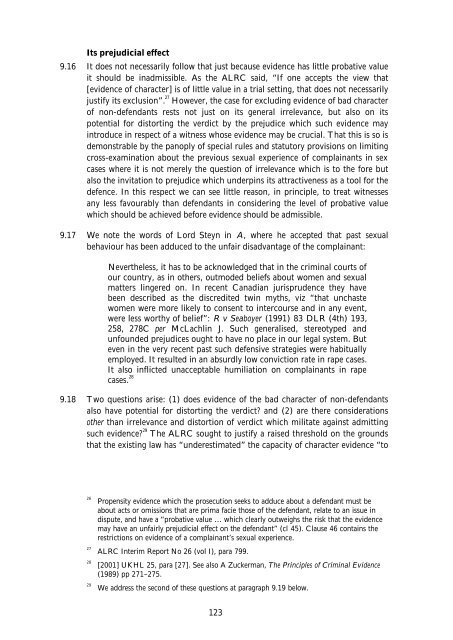Evidence of Bad Character in Criminal ... - Law Commission
Evidence of Bad Character in Criminal ... - Law Commission
Evidence of Bad Character in Criminal ... - Law Commission
You also want an ePaper? Increase the reach of your titles
YUMPU automatically turns print PDFs into web optimized ePapers that Google loves.
Its prejudicial effect<br />
9.16 It does not necessarily follow that just because evidence has little probative value<br />
it should be <strong>in</strong>admissible. As the ALRC said, “If one accepts the view that<br />
[evidence <strong>of</strong> character] is <strong>of</strong> little value <strong>in</strong> a trial sett<strong>in</strong>g, that does not necessarily<br />
justify its exclusion”. 27 However, the case for exclud<strong>in</strong>g evidence <strong>of</strong> bad character<br />
<strong>of</strong> non-defendants rests not just on its general irrelevance, but also on its<br />
potential for distort<strong>in</strong>g the verdict by the prejudice which such evidence may<br />
<strong>in</strong>troduce <strong>in</strong> respect <strong>of</strong> a witness whose evidence may be crucial. That this is so is<br />
demonstrable by the panoply <strong>of</strong> special rules and statutory provisions on limit<strong>in</strong>g<br />
cross-exam<strong>in</strong>ation about the previous sexual experience <strong>of</strong> compla<strong>in</strong>ants <strong>in</strong> sex<br />
cases where it is not merely the question <strong>of</strong> irrelevance which is to the fore but<br />
also the <strong>in</strong>vitation to prejudice which underp<strong>in</strong>s its attractiveness as a tool for the<br />
defence. In this respect we can see little reason, <strong>in</strong> pr<strong>in</strong>ciple, to treat witnesses<br />
any less favourably than defendants <strong>in</strong> consider<strong>in</strong>g the level <strong>of</strong> probative value<br />
which should be achieved before evidence should be admissible.<br />
9.17 We note the words <strong>of</strong> Lord Steyn <strong>in</strong> A, where he accepted that past sexual<br />
behaviour has been adduced to the unfair disadvantage <strong>of</strong> the compla<strong>in</strong>ant:<br />
Nevertheless, it has to be acknowledged that <strong>in</strong> the crim<strong>in</strong>al courts <strong>of</strong><br />
our country, as <strong>in</strong> others, outmoded beliefs about women and sexual<br />
matters l<strong>in</strong>gered on. In recent Canadian jurisprudence they have<br />
been described as the discredited tw<strong>in</strong> myths, viz “that unchaste<br />
women were more likely to consent to <strong>in</strong>tercourse and <strong>in</strong> any event,<br />
were less worthy <strong>of</strong> belief”: R v Seaboyer (1991) 83 DLR (4th) 193,<br />
258, 278C per McLachl<strong>in</strong> J. Such generalised, stereotyped and<br />
unfounded prejudices ought to have no place <strong>in</strong> our legal system. But<br />
even <strong>in</strong> the very recent past such defensive strategies were habitually<br />
employed. It resulted <strong>in</strong> an absurdly low conviction rate <strong>in</strong> rape cases.<br />
It also <strong>in</strong>flicted unacceptable humiliation on compla<strong>in</strong>ants <strong>in</strong> rape<br />
cases. 28<br />
9.18 Two questions arise: (1) does evidence <strong>of</strong> the bad character <strong>of</strong> non-defendants<br />
also have potential for distort<strong>in</strong>g the verdict? and (2) are there considerations<br />
other than irrelevance and distortion <strong>of</strong> verdict which militate aga<strong>in</strong>st admitt<strong>in</strong>g<br />
such evidence? 29 The ALRC sought to justify a raised threshold on the grounds<br />
that the exist<strong>in</strong>g law has “underestimated” the capacity <strong>of</strong> character evidence “to<br />
26 Propensity evidence which the prosecution seeks to adduce about a defendant must be<br />
about acts or omissions that are prima facie those <strong>of</strong> the defendant, relate to an issue <strong>in</strong><br />
dispute, and have a “probative value … which clearly outweighs the risk that the evidence<br />
may have an unfairly prejudicial effect on the defendant” (cl 45). Clause 46 conta<strong>in</strong>s the<br />
restrictions on evidence <strong>of</strong> a compla<strong>in</strong>ant’s sexual experience.<br />
27 ALRC Interim Report No 26 (vol I), para 799.<br />
28 [2001] UKHL 25, para [27]. See also A Zuckerman, The Pr<strong>in</strong>ciples <strong>of</strong> Crim<strong>in</strong>al <strong>Evidence</strong><br />
(1989) pp 271–275.<br />
29 We address the second <strong>of</strong> these questions at paragraph 9.19 below.<br />
123

















